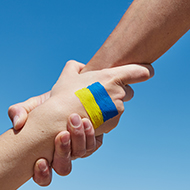
How to help when you don't have a spare room.
Many kind members of the veterinary professions are keen to help Ukrainian people and animals during this very difficult time, however, not everyone has the available space or situation to take in a refugee. Thankfully though, there are several other ways to get involved and provide practical help to those in need.
Donations
Financial donations are a great way to provide direct support to Ukrainian people, and allow you to choose the level of commitment you are capable of.
Many organisations, including the Red Cross and DEC Humanitarian Appeal have stated that financial donations are the most useful right now, as they do not require sorting or sending, and allow the teams to purchase the necessary items locally. It is often better to donate to larger charities who already have established local links, to ensure that any money donated is used effectively.
If you have essential supplies to donate, such as first aid and sanitary products, you should check online to find a collection point that will take them. Many charities and community groups are gathering essential supplies for refugees.
Organisations accepting financial donations for Ukraine include:
• The Disasters Emergency Committee
• The Red Cross
• UNICEF
• Sunflower of Peace
• UN Crisis Relief Ukraine Humanitarian Fund
Taking action in your community
Although you may be unable to take in a refugee, there are still many ways you can support refugees joining your local community. You can volunteer your time to help a local refugee with things such as language, learning about the local area, signposting them to professional support, and most importantly, friendship.
There may be local organisations or initiatives in your area that can help connect you with refugees looking for friendship and guidance, alternatively you may know someone personally who is taking part in the Homes For Ukraine scheme, and wish to support them throughout the process.
Support the veterinary response
Many veterinary organisations have offered support or created fundraisers for Ukrainian people, and supporting these initiatives is a useful way to provide practical assistance. British Veterinary Professionals for Ukraine is calling for physical and financial donations for direct delivery to the border, to help both human and animal medics working on the Ukrainian frontline.
Another coalition, 'British Equestrians for Ukraine' has been formed to collect essential supplies for horses and equestrians in Ukraine, including feed, bedding and veterinary equipment.
Get in touch
We’re looking to hear from anyone who has applied to the Homes For Ukraine scheme for a series on MRCVSOnline and VNOnline. What has been your experience of the process so far, and what advice would you give to anybody looking to host refugees in the UK? Please email editor@mrcvs.co.uk



 The Federation of Independent Veterinary Practices (FIVP) has announced a third season of its podcast, Practice Matters.
The Federation of Independent Veterinary Practices (FIVP) has announced a third season of its podcast, Practice Matters.